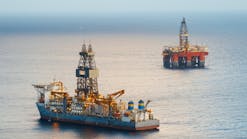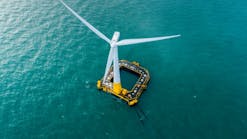Pressure increases for routine drug/alcohol tests among offshore crews
Due to the risks to health and safety arising from drug and alcohol use, more offshore companies are insisting on regular tests to ensure that their employees are drug free. One of the first offshore assignments for Marconova, a specialist in this field based in Sweden, was for Heerema Marine Contractors in the Gulf of Mexico.
Marconova ran a series of quarterly tests for Heerema last year outside Louisiana, where three of the contractor's crane-barges, Thialf, Hermod, and Balder, were based. Also included in the testing program were the crews of supply vessels working under contract to Heerema.
Following this program, Marconova plans to target the offshore sector more actively, according to partner Captain Anders Jakobsson. With its a global network of some 40 collectors, mainly medical personnel such as nurses and doctors, it is one of the few testing companies offering worldwide services, and already has some three dozen marine customers.
When a crew is due to be tested, the collector at the relevant port of call is mobilized. On the vessel itself, usually only the master has advance warning of the test. According to the new ISPS code, the master must be given at least 24 hours' notice. Normally everyone on board is tested, supplying urine samples which are then sent to Marconova.
The company is responsible for controlling the whole chain of custody. This covers planning the test, collecting the samples, ensuring that collectors and local agents follow all the procedures, transporting the samples to Sweden, carrying out an initial screening, and sending samples giving a positive reading to a hospital laboratory for confirmation analysis.
The samples are tested for nine kinds of narcotic and alcohol. Each sample given is divided into two. Screening and possible further analysis is performed on the A sample. In the event of a positive result the B sample, still sealed, has to be stored for a year. About 2% of samples screened by Marconova are classified as "pending positive," says Jakobsson.
Strict precautions have to be taken to identify false positives. About half the "pending positive" samples prove to be false alarms. These can be caused, for example, by medicines innocently taken. In China there are anti-flu pills that contain amphetamine, while some painkillers contain codeines, which can metabolize into morphine.
The trend toward testing in the offshore and marine sectors was started by ExxonMobil in the 1990s, after it turned out that alcohol consumption played a role in the Exxon Valdez oil spill in Alaskan waters. Many oil companies have followed ExxonMobil's lead, though testing itself is not a legal requirement.
For further information contact Captain Anders Jakobsson, Marconova. Tel +46 31 769 1060, fax +46 31 769 1069. [email protected], www.marconova.com




